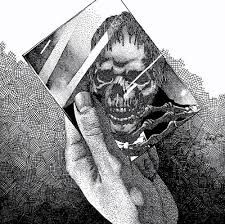 Appendix X is a collection of damned things.
Appendix X is a collection of damned things.
I am using the phrase in the Fortean sense, of course. In The Book Of The Damned, Charles Fort discusses the tendency of the human mind to systematize data, to make categories and taxonomic schemas. It is, on the whole, a very positive talent. It allows us to arrange elements into a periodic table and to deduce the age of a manuscript by details of the language used.
However, it also engenders border myopia. Like those amphibians that are reputed to be able to see only objects in motion, we human beings have a cognitive blind spot—we tend to see clearly only those things that we can pigeonhole. The most vivid objects in our sensorium are those which are unquestionably what they are and most definitely not what are they are not.
As I say, that’s just how human minds are built, and most of the time it serves us better than not.
There does exist, though, a class of objects that can only be seen from the corner of the eye. Things that aren’t exactly what they are, or, rather, what they are isn’t exactly what our systems have decreed they should be. Things neither fish nor fowl nor good red beef.
Charles Fort called them “damned things”. Damned by science, damned by our mind’s desire that the universe make absolute sense all of the time, rather than—as is the case—being mostly comprehensible, most of the time. Damned in the sense of excluded, ignored.
I have adopted his nomenclature to the literary. When Jeffro asked me if I would be willing to submit columns for this blog the first thing that came to me was the redemption of the unjustly condemned. As an omnivorous reader I have long had a weakness for the codex infernal.
I like the borders, the artistic phase changes where science fiction becomes horror, fantasy becomes mystery, western becomes romance. I like villains who become heroes, innocent bystanders who turn out to be more than they seem, or less. I am, in fact, something of an epistomological masochist. I read fiction in order to believe something that isn’t true, that can’t be true. I want to be astonished, amazed, confused, frightened, lied to. I like books that aren’t safe and don’t play by the rules.
Sadly, the business of bookselling in the Twentieth Century did not share my passion for the damnable. As the nationwide chains replaced the individually owned bookstores publishers began to respond to market pressure for clarity and simplicity of product line. The New Wave had scarcely gotten started before it was choked off by the need for books to fit neatly on one shelf and one shelf only. Over here was science fiction, over there was fantasy, mystery is against this wall, horror in the corner, and romance right in the middle, modern to the right, historic to the left.
Border myopia grew into institutional policy. We will stock—said the nationwide chains—only those books which can be properly shelved by a high school student who was flipping burgers yesterday and has never read for pleasure anything more challenging than The Berenstain Bears Are Devoured By Screwfly Larvae.
The nationwide publishers responded by giving the nationwide chains exactly what they asked for.
Most of the time. A few damned things slipped through, from time to time. Some authors had enough of a following to get away with breaking rules, and some editors were willing to buy works that were good, but not easily defined. A few publishers were somewhat more willing to take risks, or simply hadn’t gotten the memo in time.
I followed with a great deal of enjoyment Jeffro’s series on the books of “Appendix N”, which is why I settled upon “Appendix X” when casting about for a name for this series.
X for excluded. I want to highlight those works which don’t show up on lists of The Best Of This Thing Or That Thing. Instead, I want to compile a list of The Best Of Neither One Thing Nor The Other. Or, if not the best, at least my personal favorites.
I’ll be writing about books that I personally enjoyed and can recommend that fall within the broad rubric of Speculative Fiction but which, for one reason or another, violate the traditions and conventions that govern the finer classification system of Science Fiction, Fantasy, and Horror. I’ll be heading off the beaten path and into the wilderness.
I hope that I’ll be able to introduce readers of this blog to stories that they might not otherwise have read. If one is familiar only with the broad thoroughfares of the fantastic there is a great deal of unexplored territory within the blank spaces on the map. And while dragons do abide there, I will do my best to invite only the well-tempered sort to join us.
—
Misha Burnett is the author of Catskinner’s Book, Cannibal Hearts, The Worms Of Heaven, and Gingerbread Wolves, modern fantasy novels collectively known as The Book Of Lost Doors.
Please give us your valuable comment